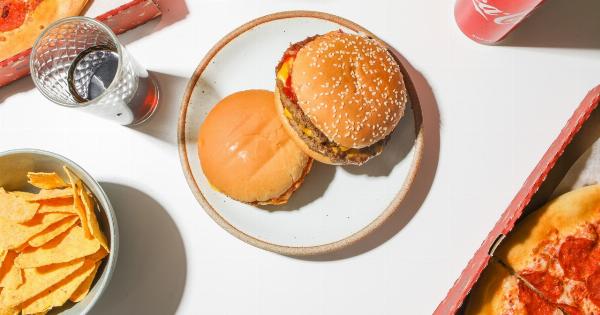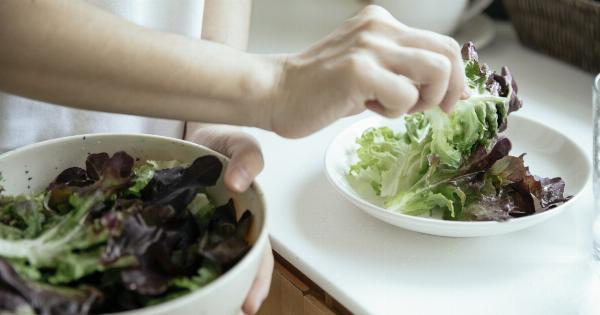Microwaves are the most commonly used kitchen appliance in most households. They are handy, quick, and convenient, making it easy to prepare meals in minutes.
The microwave oven uses electromagnetic radiation to heat food, making it a reliable appliance for busy individuals. However, not all types of foods should be microwaved, as this can lead to disastrous outcomes. In this article, we will take a look at the foods that should not be microwaved.
Plastic Containers
It’s common to store leftover food in plastic containers, but when it comes to reheating them in the microwave, it’s not a good idea. Heating plastic containers in a microwave can lead to an array of problems.
Plastic containers release harmful chemicals, such as BPA, when heated in a microwave, which can cause health issues. Additionally, plastic containers can melt, leading to a mess in your microwave and potential damage to the appliance.
Foods with High Water Content
Foods with high water content, such as eggs or greens, should not be microwaved. Microwaving these types of foods can cause them to explode and make a mess inside of your microwave.
The steam and pressure that build up inside the food when you heat it in the microwave can cause it to burst. Therefore, it’s best to avoid these foods or cook them on the stovetop or in the oven instead.
Grapes
You may think of grapes as a healthy snack, but they can be deadly when microwaved. Grapes are composed of water and ions that can create an electrical current when heated in a microwave, which can cause a spark, and lead to a fire.
Therefore, avoid microwaving grapes at all costs.
Bread
Bread should not be microwaved, as it will turn hard and chewy. The microwave’s radiation heats up the water content in the bread, causing it to evaporate and lose moisture, which results in a less than desirable texture on the bread.
Instead, place it in the oven for a crispy texture or a toaster for a softer texture.
Processed Meats
Processed meats such as hot dogs or sausages should not be microwaved, as they can cause the appliance to malfunction.
These types of foods contain a lot of fat and salt, which can lead to excess steam build-up inside the microwave, and cause it to stop functioning properly. Additionally, they can become too hot and burn or explode, resulting in a mess and potential harm to individuals in the area.
Frozen Meat in its Packing
Reheating frozen meat inside its packing can cause an array of problems. The packaging material can release harmful chemicals when exposed to the microwave’s radiation, which can be harmful to your health.
Additionally, the packing material can melt, causing a mess inside your microwave. Instead, transfer the frozen meat to a microwave-safe container and heat it according to the package’s instructions.
Fruits and Vegetables with Skin
Fruits and vegetables with skin, such as potatoes or tomatoes, should not be microwaved. The radiation from the microwave causes them to lose their moisture, leading to a leathery texture.
Additionally, the skin can burst, leading to a mess inside your microwave. Instead, peel the skin before placing them in the microwave, or bake them in the oven for a crispy texture.
Frozen Foods in Non-Microwave Safe Containers
Be careful when microwaving frozen foods in non-microwave safe containers, as they can cause a fire. Non-microwave safe containers can release toxic chemicals and emit smoke when exposed to the microwave’s radiation, which can cause a fire.
Additionally, these containers can melt, causing a mess inside your microwave. Instead, transfer the frozen food to a microwave-safe container and heat it according to the package’s instructions.
Aluminum Foil
Aluminum foil is a common kitchen accessory, but it should never be used in the microwave. Aluminum is a good conductor of electricity and can create a spark when in contact with the radiation from the microwave, which can cause a fire.
Additionally, aluminum can create hotspots, which can burn the food you’re heating.
Styrofoam Containers
Styrofoam containers should not be microwaved, as they can release harmful chemicals when exposed to the appliance’s radiation. These containers can melt, releasing toxins into your food, which can cause health problems.
Therefore, it’s best to avoid using them altogether.
Conclusion
Microwaves are convenient appliances, but not all types of foods should be reheated in them.
Plastics, high water-content foods, grapes, bread, processed meats, frozen meat in its packing, skin-on fruits and vegetables, frozen foods in non-microwave safe containers, aluminum foil, and Styrofoam containers should not be microwaved. It’s important to know what types of foods and containers can be safely heated in the microwave to avoid accidents, messes, and potential health issues.




























